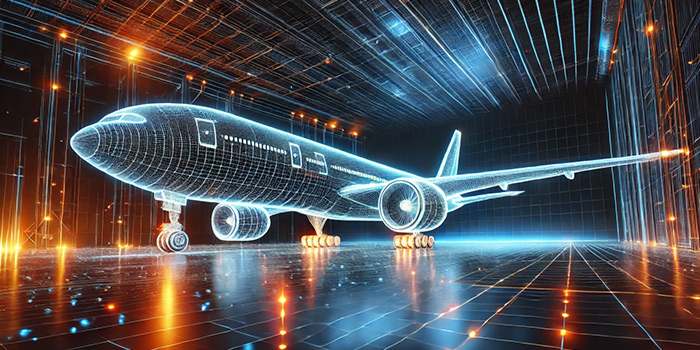Digital Trends Shaping the Future of Aviation
21 Nov 2024
Highlights:
By AviaPro Consulting
The aviation industry is at a pivotal crossroads, where digital transformation is not only redefining operations but also reshaping how airlines interact with passengers. The COVID-19 pandemic has been a major catalyst in accelerating this transformation, pushing airlines to rethink their strategies and embrace emerging technologies. AviaPro Consulting has been helping airlines navigate these changes, ensuring they remain competitive and efficient in this new digital era.

“Digital transformation in aviation is no longer optional—it’s essential. Airlines that adapt quickly to the latest technologies are poised for long-term success, as they will be better equipped to meet the evolving expectations of their customers and operational demands,” explains Kevin Clarke, Head of Aviation Consulting and Inspection Services at AviaPro Consulting.
Let’s look at some of the key trends reshaping commercial aviation.
Market Analysis and Demand Forecasting: Predicting Success
One of the cornerstones of digital innovation in aviation is data-driven market analysis and demand forecasting. Airlines are now using advanced statistical models and analyzing vast amounts of historical data to accurately forecast passenger demand. This enables them to optimize flight routes, schedules, and revenue streams more effectively than ever before.
“As we’ve seen, airlines that adopt data-driven demand forecasting strategies can achieve significant operational improvements,” says Clarke. “These strategies not only increase efficiency but also enable better decision-making, leading to a more profitable business model.”
According to a report from McKinsey, airlines that have embraced data analytics in their forecasting processes have witnessed a 20% increase in operational efficiency.
Blockchain: Revolutionizing Airline Operations and Security
Blockchain technology is making significant strides in enhancing the security, transparency, and efficiency of airline operations. This decentralized ledger system is particularly useful in areas such as identity verification, ticketing, and aircraft maintenance.
Airlines like Air France have implemented a blockchain-based health passport system, reducing verification times by 30% and enhancing passenger experiences. British Airways has seen a 20% improvement in ID verification accuracy through blockchain, while Singapore Airlines’ KrisPay program has led to a 25% rise in user engagement.
“The adoption of blockchain in aviation is transformative. It’s streamlining operations, reducing fraud, and offering an enhanced level of security that was previously unattainable,” Clarke adds.
Biometrics: Simplifying the Passenger Journey
The future of air travel is increasingly being shaped by biometric technology. From facial recognition to fingerprint scanning, biometrics are revolutionizing the way passengers check in, board flights, and pass through security checkpoints.
Delta Airlines has introduced biometric self-service luggage drops, and Air New Zealand has adopted facial recognition boarding, eliminating the need for traditional boarding passes. According to industry research, 70% of airlines plan to implement biometric ID management systems by 2026.
“Biometrics will be a game-changer for the passenger experience. Travelers want quicker, more seamless journeys, and airlines that embrace these technologies will undoubtedly stand out,” Clarke remarks.
Virtual and Augmented Reality: Elevating Passenger Engagement
Another exciting development is the use of virtual and augmented reality (VR and AR) to enhance the customer experience. Airlines such as Lufthansa and Etihad Airways are already offering virtual tours of their aircraft, allowing passengers to preview seating options and amenities before their flights.
“By incorporating VR and AR, airlines are not only creating a more interactive experience for passengers but also setting themselves apart in an increasingly competitive market,” Clarke highlights.
In addition, Emirates has integrated VR activities into its onboard entertainment systems, providing unique in-flight experiences that go beyond traditional entertainment options.
The Digital Airline Ambition 2030: A Roadmap for Success
Looking ahead, the Digital Airline Ambition 2030 framework is set to guide airlines towards full digital maturity. This comprehensive approach emphasizes the adoption of cutting-edge solutions in five key areas: digital infrastructure, customer experience, operations, regulatory compliance, and sustainable growth.
“At AviaPro, we believe that the future of aviation lies in embracing digital transformation across all levels of operation,” says Clarke. “By 2030, airlines that prioritize digital innovation will not only improve operational efficiency but also drive sustainable growth and deliver unparalleled customer experiences.”
A Digitally Driven Future for Aviation
The aviation industry is on the cusp of a digital revolution. Technologies such as blockchain, biometrics, and virtual reality are not only transforming operations but also enhancing the passenger journey. As we approach 2030, airlines that invest in these digital trends will lead the industry forward, ensuring long-term success in an ever-evolving landscape.
“Digital transformation is about more than just technology—it’s about creating a future where efficiency, sustainability, and customer satisfaction go hand in hand,” concludes Clarke. “At AviaPro, we’re committed to guiding our clients through this transformation, helping them thrive in the digital age.”
AviaPro Newsroom
+1 416-544-9969
info@aviaproconsulting.com

Editorial Contacts